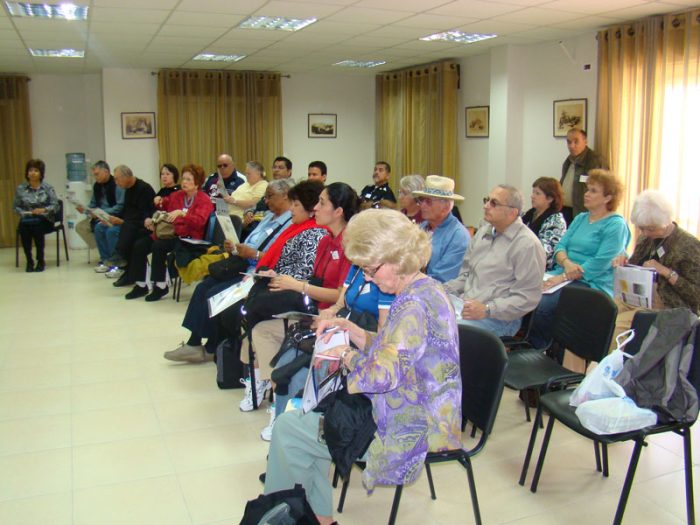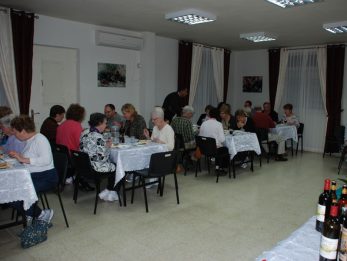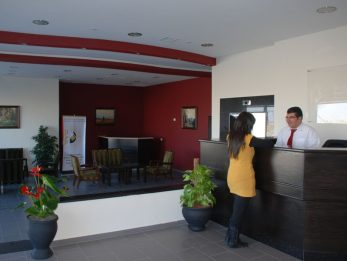The mission of the Ecumenical Center for Research and Development is based on the HCEF mission to help the churches and people of the Holy Land enhance their role as agents for social justice and equity in all spheres of life at the community level and actively engage in local, regional, and international efforts to make the world a better place.
- Ecumenical Partnerships
- Commitment to Social Justice
- Inclusion, Dialogue, and Peace
- Service and Regional Vitality
- Accountability, Fiscal Responsibility, and Transparency
The mission has four basic goals:
- Advocacy and Social Justice to create a greater understanding of the presence and witness of Arab Christians in the Holy Land and their current concerns.
- Economic Development to enable training and re-training for career advancement, employment, and better living conditions.
- Educational Reform to provide opportunities for modern education and learning, as related to teachers and students in church schools.
- Leadership Development to generate new ideas and help give ideas “legs” so as to empower people and the institutions they work in and lead.
- Health Education Initiative to employ strategies to increase the efficiency and effectiveness of health care resources to ensure a viable and accessible health care system for the people of the Palestinian territories.
- Research and Outreach to examine how ecumenism functions in contemporary societies, how it impacts important issues of the day, and how decisions are made about it in order to bring forth unity among churches. The intent is to disseminate this research through conferences, symposia, and publications, and to have it available at a resource center and library.
BASIC GOALS AND OBJECTIVES
I. Advocacy and Social Justice
Individuals and groups from around the world are encouraged to work together with the churches of Jerusalem and the local community for a just, comprehensive, and enduring peace, informed by truth and made stronger with prayer and action.
This is accomplished by:
- Strengthening the ecumenical network and inter-church relations through access to all denominations, parishes, and schools in order to advocate for inclusion, human rights, justice, and non-violence.
- Building an extensive contact network, both local and international, of individuals and organizations working to advance positive peace, reconciliation in the Holy Land and improve the lives of all inhabitants there.
Sustainable economic development and equal opportunities for work to address the economic sphere of life and explore what it means to integrate the work of the church and the demands of the workplace, how it is instrumental in developing equal opportunities to the marginalized and in providing a positive setting for learning and growth.
This is accomplished by:
- Reducing economic deprivation and ameliorating living conditions amongst the most vulnerable by
- Creating jobs and higher employment
- Supporting home rehabilitation and providing basic needs
- Making possible affordable housing schemes and microcredit
- Supporting local crafts and crafts work, including small business and microenterprise initiatives
- Providing services to the elderly and children with special needs
- Professional development and training by
- Initiating and sustaining training programs for lay community leaders with special attention to women
- Offering ongoing professional development courses through online and modular training in administration, finance, strategic planning, and sustainable development and new technologies
- Promoting networking and engagement between and among church institutions and the private sector through workshops, symposia, and joint work to create channels for career placements, internships, career development, and on the job training
Projects
These projects are available but not limited to
- Financial management and training.
- Labor Intensive Community Development Projects such as HCEF, Home Rehabilitation Program (HRP) , Holy Land Gift Program (HLGP)
- Develop and advance the Livingstone program.
- Operation and management of the Guest house at the Center to become a self-sustaining generating income to the overhead of the center.
- Retail initiatives such as the Souvenir Shop etc
- Agricultural Initiatives
Equal opportunities to education and learning focusing on the responsibilities of churches and its affiliated school systems, mainly educational reform related to the quality of educational facilities, methodology, evaluation, and teaching—all essential for developing each school into an educational environment compatible with changes at the national, regional, and international levels and enhancing its capacities to develop and sustain its services to the neediest in the local communities.
This is accomplished by:
- Enhancing private schools capacity to ensure equal educational opportunities to students in the area they serve by standardizing school facility, adding new classrooms when necessary, and appointing competent staff to different grades and subjects.
- Enhancing the educational and learning process by developing learning and teaching guides, in-service teacher training, and uniform evaluation parameters that are consistent with the national educational plan as well as the particularity of private schools.
- Developing after school vocational and technological education programs that enhance students’ life skills as well as offer opportunities to adults in the area to benefit the school facilities as part of a community adult education program.
- Developing sound administrative and organizational structure for schools to secure effective and efficient utilization of resources to promote sustainability of services and better cohesion with the developments of the local community.
Projects
- Training the Educators Workshops: To train supervisors and teachers in organizations and schools over a five-year period by offering them a series of specialized workshops in a variety of needs, including critical thinking, conflict resolution and mediation, program development, financial management, and strategic planning.
- Special Education Program: To educate 25 school leaders per year in the fundamentals of special education as practiced in the United States, who will be prepared to train classroom teachers to better serve the needs of K-12 students who have learning difficulties.
- College preparation/Student counseling Sessions: To offer services in a variety of needs related to students’ daily life and preparation for college, including private and group sessions on anxiety, depression, stress, study skills, test-taking, time management, and trauma.
- English as a Foreign Language Courses: To offer courses to children and adults in English to enable them to speak and read accurately and effectively, to express their ideas in writing, to understand formal and informal speech, and to become comfortable and confident in their communicating in English.
Enhancement of leadership and social responsibility amongst the youth. This is accomplished by
- Preparing the youth for active and responsible citizenship to help them in the process of addressing their living conditions and livelihood based on normative principles (i.e., non-violence, human rights, and social, economic, political, and ecological justice) and promoting action for the common good.
- Utilizing schools and universities as learning environments that will contribute to the transmission of civic values and human rights and assert the need for an intentional interrelationship between pedagogy and content.
- Encouraging global partnerships to foster better understanding and dialogue among cultures and create spaces for dialogue and exchange among the different cultures, religions, and groups.
- Organizing year-round programs in coordination with the network of schools, utilizing all facilities and ensuring equal participation and representation amongst area youth, while concentrating on leadership, communication, expressive skill development, vocational training, and cultural enhancement programs.
- Organizing exchange programs amongst schools, universities on local, regional, and international levels, as well as encouraging volunteer exchange and internships programs through school contests, summer programs, youth camps, and cultural events during and after school.
Projects
- HCEF Shabibeh (Youth) Program: To empower Christian youth to be uplifted in their identity as Arab Christians, to meet the current challenges of their living status in the Holy Land, by promoting Christian values, ecumenism, and peace and justice.
V. Health Education Initiative
The challenges of providing efficient and effective health care resources are exacerbated by the lack of comprehensive information concerning the current status of available medical facilities, equipment, personnel and professional development needs and opportunities.
This will be accomplished by:
- Identifying and reporting on the conditions and status of health in the Holy Land including professional development and infrastructure needs of the health care industry.
- Securing funding for the personnel and infrastructure required to deliver a comprehensive health professions training program.
- Increasing the cooperation and complimentary efforts of government, private and NGO services.
- Developing an operational model of “Abrahamic” cooperation and interfaith understanding among Christians, Muslims and Jews in the USA and Holy Land through a joint health professions training program and serving as management for the Interfaith Cooperation Health Initiative for the Holy Land (ICHI)
Building a bridge for understanding, tolerance, and appreciation of cultural diversity, which involves the creation of a platform for sharing experiences and commonality amongst communities at local, regional, and international levels to
This is achieved by:
- Creating partnerships and exchanges on church, school, university levels through exchange programs, joint projects, and engaged communications.
- Conducting conferences and workshops on local, regional, and international levels and networking amongst organizations and research centers that hold similar values and have similar objectives.
- Publishing research materials and disseminating same amongst intellectual circles and relevant organizations, and making such resources public in print and soft format.
Projects
- Conferences, symposia, workshops
- Books, articles, newsletter
- Web site, Palestine





















